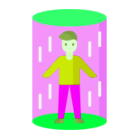5. A closer look at the skeptic’s argument
 I’m claiming that the skeptic needs both of these premises:
I’m claiming that the skeptic needs both of these premises:
To see why this should be so, it will help first to see that the presupposition would not be needed if the skeptic was merely tying to establish that the person who wakes up on Mars (whether original or copy) would not know whether he was original or copy. To establish this slightly different conclusion, it would suffice to rely on the fact alone. The following inference, that is to say, may be agreed to be valid:
 What does persuade me, nevertheless, that the first of these two conclusions may be derived from the fact (alone) that waking up on Mars as the original subject is exactly like waking up on Mars as the copy, is to imagine God inviting someone to use the machine, proceeding thereafter to make the machine work or fail (at random, say) and then challenging the person who wakes up on Mars to say whether he was real or copy.—I assume that God may make the machine work or fail at random, or otherwise as he pleases.
What does persuade me, nevertheless, that the first of these two conclusions may be derived from the fact (alone) that waking up on Mars as the original subject is exactly like waking up on Mars as the copy, is to imagine God inviting someone to use the machine, proceeding thereafter to make the machine work or fail (at random, say) and then challenging the person who wakes up on Mars to say whether he was real or copy.—I assume that God may make the machine work or fail at random, or otherwise as he pleases.
Should this test be repeated, it seems clear that God would find that the person waking up on Mars would be unable to do better than chance, over the long run, in divining whether he was real or copy, and thus whether the machine had worked or failed. This person would have nothing to go on, in any given case, since being copy is indistinguishable from being real, and whether he is real or copy was determined at random. Nor would he be able to game the test by guessing the answer according to some clever strategy, since, again, whether he is real or copy was determined at random, like the toss of a fair coin. Consulting his test data, God would find that the person who awakens on Mars—original or copy, indifferently, depending on whether the machine had worked or failed—would be able to divine his identity only half the time, at best, over the run of tests, and couldn’t by any stretch be said to know whether he was real or copy. He wouldn’t be able to tell, and would at best just be guessing. Or he might simply remain silent, declining to venture an opinion, in recognition of his ignorance, which comes down to the same thing for us: he wouldn’t know.
 So I agree that it does automatically follow from the fact that waking up on Mars as the original subject is exactly like waking up on Mars as the copy that the person who wakes up on Mars will not be able to tell whether the machine had worked or failed. What doesn’t automatically follow, it seems to me, is that the original subject, should he awaken on Mars, wouldn’t be able to tell. This is easy to miss because one might think that, if the former conclusion follows, then so must the latter, since the original subject, should he awaken on Mars, would naturally then be the person who wakes up on Mars. But this would be a mistake and we should pause to see why.
So I agree that it does automatically follow from the fact that waking up on Mars as the original subject is exactly like waking up on Mars as the copy that the person who wakes up on Mars will not be able to tell whether the machine had worked or failed. What doesn’t automatically follow, it seems to me, is that the original subject, should he awaken on Mars, wouldn’t be able to tell. This is easy to miss because one might think that, if the former conclusion follows, then so must the latter, since the original subject, should he awaken on Mars, would naturally then be the person who wakes up on Mars. But this would be a mistake and we should pause to see why.

Fact. Waking up on Mars as the original subject is exactly like waking up on Mars as the copy. Presupposition. Should the copy wake up on Mars, he would care to know that the machine had failed.
in order to reasonably infer:Conclusion. Should the original subject wake up on Mars, he would not know whether he was original or copy.
and, in particular, that fact alone does not yield conclusion without the support of presupposition.To see why this should be so, it will help first to see that the presupposition would not be needed if the skeptic was merely tying to establish that the person who wakes up on Mars (whether original or copy) would not know whether he was original or copy. To establish this slightly different conclusion, it would suffice to rely on the fact alone. The following inference, that is to say, may be agreed to be valid:
Waking up on Mars as the original subject is exactly like waking up on Mars as the copy. Therefore, the person who wakes up on Mars will not know whether he is original or copy.
This may seem obvious enough, and in no need of elaborate comment, but I do need to say something about this, since it can seem likewise “obvious” that the fact alone suffices to establish the initial conclusion that the original subject would not know whether he was real or copy, should he wake up on Mars—but that (in contrast) is precisely what I am denying. The trouble is that this is not the brain defect case, where things are relatively simple. Thus, I do find the parallel inference in the brain defect case to be fairly straightforward, given that it involves a single person who has been placed (at random, say) in one of two indistinguishable situations: it seems clear that he wouldn’t know in which situation he was. But our case involves two people, not one, and the complications this raises are not obvious to me. The fact that these two conclusions may be distinguished in our case:The person who wakes up on Mars will not know whether he is original or copy. The original subject, should he wake up on Mars, would not know whether he was original or copy.
should alone give us pause.
Should this test be repeated, it seems clear that God would find that the person waking up on Mars would be unable to do better than chance, over the long run, in divining whether he was real or copy, and thus whether the machine had worked or failed. This person would have nothing to go on, in any given case, since being copy is indistinguishable from being real, and whether he is real or copy was determined at random. Nor would he be able to game the test by guessing the answer according to some clever strategy, since, again, whether he is real or copy was determined at random, like the toss of a fair coin. Consulting his test data, God would find that the person who awakens on Mars—original or copy, indifferently, depending on whether the machine had worked or failed—would be able to divine his identity only half the time, at best, over the run of tests, and couldn’t by any stretch be said to know whether he was real or copy. He wouldn’t be able to tell, and would at best just be guessing. Or he might simply remain silent, declining to venture an opinion, in recognition of his ignorance, which comes down to the same thing for us: he wouldn’t know.

Menu
 Can teleportation be verified empirically?
Can teleportation be verified empirically? What’s a logical paradox?
What’s a logical paradox? Achilles & the tortoise
Achilles & the tortoise The surprise exam
The surprise exam Newcomb’s problem
Newcomb’s problem Newcomb’s problem (sassy version)
Newcomb’s problem (sassy version) Seeing and being
Seeing and being Logic test!
Logic test! Philosophers say the strangest things
Philosophers say the strangest things Favourite puzzles
Favourite puzzles Books on consciousness
Books on consciousness Philosophy videos
Philosophy videos Phinteresting
Phinteresting Philosopher biographies
Philosopher biographies Philosopher birthdays
Philosopher birthdays Draft
Draftbarang 2009-2025  wayback machine
wayback machine
 wayback machine
wayback machine
 April 2025
April 2025